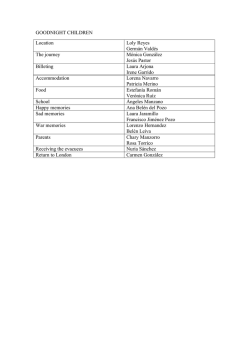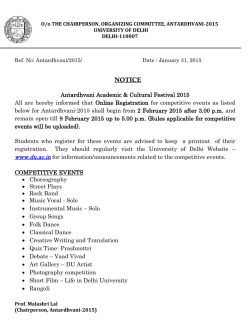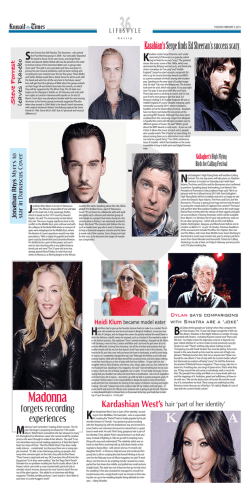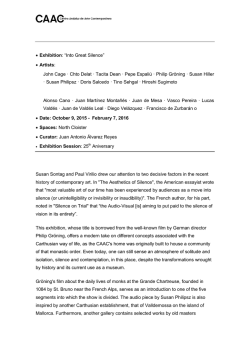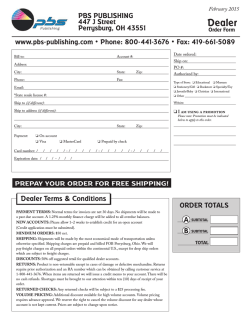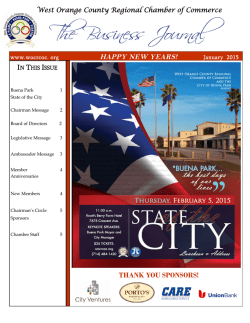
Untitled - Buena Vista Social Club
BUENA VIS TA S O C IA L C L UB The original Buena Vista Social Club album was recorded for World Circuit Records over seven days in Havana in 1996, bringing together many of the great names of the golden age of Cuban music in the 1950s, several of whom were coaxed out of retirement for the sessions.The Album became a surprise international best-seller and the most successful album in the history of Cuban music. At the time, nobody had the idea that the record was merely the start of a musical phenomenon. In the years that followed, the Buena Vista veterans toured the world and were the subject of a celebrated feature film directed by Wim Wenders. Further acclaimed recordings followed, including solo releases from the singers Omara Portuondo and Ibrahim Ferrer, virtuoso pianist Rubén González, trumpet star Manuel ‘Guajiro’ Mirabal and a celebratory live album recorded at a triumphant concert at New York’s Carnegie Hall. Buena Vista Social Club had become a household name. ‘Lost and Found’ is a collection of previously unreleased tracks recorded both at the original legendary sessions produced by Ry Cooder and during the extraordinarily rich outpouring of music that followed. All the studio tracks were recorded for World Circuit in Havana during the rich and prolific period of creativity that followed the recording of the original album and stretched into the early 2000s. Spiced with live recordings from the same fertile period, there’s a tremendous and sometimes surprising variety to the material heard on Lost and Found. But there is a unifying thread built around a core collective of legendary musicians expressing an esprit de corps which everyone who was ever enchanted by Buena Vista Social Club will recognise and enjoy. A World Circuit Production Produced by Nick Gold Macusa and Lágrimas Negras produced by Ry Cooder Recorded and mixed by Jerry Boys Mastered byTom Leader and Bernie Grundman Photography by Christien Jaspars Designed by House at Intro Sleeve notes by Nigel Williamson Archive research and additional production byTim Jenkinson With thanks to Juan de Marcos González and everyone who made this record possible. 1.Bruca Manigua (Arsenío Rodríguez) Following the release of his debut solo album at the age of 72, Ibrahim Ferrer took to the road in 2000 with a ‘banda gigante’ (the name Benny Moré gave his 1950s era Havana big band) and a fi zzing set of orchestrations by conductor and trombone player Demetrio Muñiz.This song, written by Arsenio Rodríguez in the 1930s, was featured on the album, ‘Buena Vista Social Club Presents: Ibrahim Ferrer’; but it’s fascinating to hear how it developed into something quite different when played live. Recorded in front of a sell-out crowd at Paris’ Zenith, the joyous swagger of the performance is matched by the surges in the audience’s applause, fi rst as Ibrahim takes the stage and then again as he treats them to his trademark dancing. 2. Macusa (Francisco Repilado) From the original Buena Vista sessions recorded at Havana’s Egrem studio in 1996, this is a classic son in the traditional Santiago style written by Francisco Repilado, better known to the world as Compay Segundo. He’s accompanied on guitar and two-part vocals by Eliades Ochoa, the same duo heard on Buena Vista’s most famous track, ‘Chan Chan’. Eliades and an at-the-time-downon-his-luck Compay had joined forces as a duo in Santiago about a year before convening for the Buena Vista sessions and their easy rapport in playing together is evident. Ibrahim Ferrer, also from Santiago, adds his voice in the coro* and Juan de Marcos González, band leader of the AfroCuban All Stars, conducts with customary fl air. solo, the son makes way for the father and Ruben delivers what turned out to be his final recorded solo at the age of 80.The distinctive electric guitar rhythm part is played by Los Zafi ros arranger Manuel Galbán. 3.Tiene Sabor (Ignacio Piñiero / Rolando Valdés) 5.Black Chicken 37 (Orlando ‘Cachaíto’ López / Miguel ‘Angá’ Diaz) From the sessions that produced Omara Portuondo’s second World Circuit album ‘Flor de Amor’ in 2004, this track features an all-girl coro in the tradition of the vocal group Cuarteto Las D’Aida with whom Omara performed in the 1950s, backing Nat King Cole at Havana’s Tropicana nightclub on one celebrated occasion. The reason for its exclusion from the album was that it was considered too energetic and high octane for what was essentially a collection of slow-tempo, smouldering love songs. 4. Bodas De Oro (Miguel Faílde) A classic danzon recorded for Jesus ‘Aguaje’ Ramos’s unfinished debut album in 2001. Trombone player ‘Aguaje’ was a mainstay of Rubén González’s band and for many years has been musical director of the Orquesta Buena Vista Social Club, a role he continues to fulfi l on the band’s 2015 ‘Adios’ tour. Much of the piano on this track is played by Rubén González’s son Rubencito; but when it comes to the main Recorded during the sessions for bassist Orlando ‘Cachaíto’ López’s jazz-tinged 2001 World Circuit album ‘Cachaito’, the theme for this improvised descarga (jam) was composed in the studio by Cachaíto and conga player Miguel ‘Angá’ Diaz, whose own experimental album ‘Echu Minga’ appeared on World Circuit in 2005. Angá, whose twin daughters now record as the duo ‘Ibeyi’, died of a heart-attack at the tragically young age of 45.The daring violin part is by Pedro Depestre, another sad loss who died on stage during his fi rst concert outside Cuba with Cachaíto’s group in Switzerland in 2001. Amadito Valdés on timbales, Carlos González on bongos and Virgilio on maracas make up a dream percussion section. 6. Habanera (traditional) Sepia-tinted images of the local brass band in a town square in Cuba around the turn of the 20th century are conjured by this lovely piece of elegant nostalgia. It was recorded for 2004’s ‘Buena Vista Social Club Presents Manuel Guajiro Mirabal’, the solo album by the trumpeter whose playing was showcased on the original Buena Vista Social Club album. In the end, Guajiro and producer Nick Gold decided to shape his album as a tribute to the music of the legendary composer and bandleader Arsenio Rodríguez, which is why this evocative piece was left in the vaults until now. 7. Como Fue (Ernesto Duarte) Another live track featuring Ibrahim Ferrer, who had always dreamed of singing bolero in front of a big band in the style of his musical hero, Benny Moré, whom he heard singing this classic song composed by Ernesto Duarte in the 1950s. A highlight of Ibrahim’s live show, this version was recorded on stage in Paris with a wonderful group that cruises with the effortless elegance and streamlined power of a luxury ocean liner. 8. Guajira en (Alegre All Stars) F Based on a recording by the New York-based ‘Alegre All Stars’ from their 1965 ‘Lost and Found’ album, this driving salsa comes from the sessions for Jesús ‘Aguaje’ Ramos’s unfinished album.The lead singer is Carlos Calunga who has been singing with the Orquesta Buena Vista Social Club touring band for more than a decade, and the trumpet solo is by Miguelito Valdés, who happened to visit the studio during recording and who contributed his solo as a fi rst take without even a run-through. As with all studio tracks on this collection the band played ‘live’ at Egrem Studios in Havana. 9. Quiéreme Mucho (Gonzalo Roig) 10. PedacitoDe Papel (Francisco Simó Alberto Damirón) If Rubén González was generally the fi rst of the Buena Vista musicians to arrive for a session, Eliades Ochoa was often the last to leave.These two exquisite, minor-key solo guitar pieces – the fi rst entirely instrumental and the second with a soulful after-hours vocal - were recorded by Eliades Ochoa during a midnight session at Egrem in 1998 after work on Ibrahim Ferrer’s fi rst album was finished for the day and everyone else had retired to bed or to the nearest bar for a nightcap. Delighted with the results, Eliades then added a few extra lines as overdubs, something he had never tried before. 11. Mami Me Gustó (Arsenio Rodríguez) 13. Como Siento (Rubén González) The Orquesta Ibrahim Ferrer bursts irrepressibly out of the traps on this rocking live take on a favourite Arsenio Rodríguez song. Ibrahim recorded the song at Egrem for his fi rst solo album; but once again, playing the song live every night took it to invigorating and adventurous new places. With Ibrahim in fine voice and potent solos from ‘Cachaíto’ on bass, ‘Aguaje’ on trombone and ‘Guajiro’ on trumpet, the band swings with swashbuckling potency. A characteristically expansive but nuanced piano solo from the late Rubén González, recorded in London on his fi rst concert tour, following the release of ‘Buena Vista Social Club’ and his own debut solo album ‘Introducing Ruben Gonzalez’ which was recorded immediately afterwards at Egrem in 1996. After coming out of retirement in his late 70s, the greatest joy of Ruben’s later years was to play live for an audience and he was particularly appreciative of how intently the audience would listen to him, with the kind of hushed respect more usually reserved for a classical recital. 12. Lágrimas Negras (Miguel Matamoros) This standout track was recorded with some urgency during the Buena Vista Social Club sessions in 1996, as lead singer Omara Portuondo was about to fl y out for a tour of Vietnam and her taxi to the airport was waiting in the street. Yet she sounds wonderfully poised and the track blissfully unhurried as Eliades Ochoa (guitar) and BarbaritoTorres (laoud) trade the theme back and forth. If it seems extraordinary that such a stellar performance was omitted from the original album, the offi cial explanation is that the song – one of the great standards of Cuban music written by Santiago’s Miguel Matamoros – was felt to be too well known for inclusion. 14. Yo Ruben sings! Rubén caught singing a guide piano solo during rehearsals at Havana’s Egrem studios. * Chorus vocals MUSICIANS Bruca Manigua,Como Fue, Mami Me Gustó Ibrahim Ferrer vocal Demetrio Muñiz band leader, trombone, coro Adolfo Pichardo piano Orlando ‘Cachaíto’ López bass AngelTerry Domech congas Filiberto Sánchez timbales Roberto García bongos Lázaro Villa maracas, coro Manuel ‘Guajiro’ Mirabal trumpet, coro Alejandro Pichardo trumpet, coro Jesús ‘Aguaje’ Ramos trombone, coro Javier Zalba alto, soprano sax Pantaleón Sánchez alto sax Rafael ‘Jimmy’ Jenks tenor sax Tony Jiménez tenor sax Ventura Gutiérrez baritone sax Macusa Eliades Ochoa Compay Segundo Orlando ‘Cachaíto’ López Ibrahim Ferrer Juan de Marcos González Carlos González Joachim Cooder Alberto ‘Virgilio’ Valdés vocals, guitar vocals, guitar bass coro coro and conductor bongos dumbek maracas Tiene Sabor Omara Portuondo vocals Orlando ‘Cachaíto’ López bass Manuel Galbán acoustic guitar Swami Jr. 7-string guitar Jorge Chicoy electric guitar Ramses M. González drums Carlos González clave Alberto ‘Virgilio’ Valdés maracas Amadito Valdés timbales Julián Corrales violin Enrique Lazaga guiro Caridad Valdés Menéndez coro Yaremi Alfonso Nápoles coro Idania Valdés Casuso coro Riena Hernández Centeno coro Bodas De Oro Jesús ‘Aguaje’ Ramos band leader, trombone, coro* Rubén González piano solo Rubencito González piano Orlando ‘Cachaíto’ López bass Manuel Galbán electric guitar Miguel ‘Angá’ Diaz congas Amadito Valdes timbales Carlito Gongalez bongos Enrique Lazaga Guiro Manuel ‘Guajiro’ Mirabal trumpet Alejandro Pichardo trumpet, coro Miguelito Valdés trumpet solo Luis Alemány Conde trumpet Yanko Pisaco trumpet Yaure Muñiz trumpet Black Chicken 37 Orlando ‘Cachaíto’ López Miguel ‘Angá’ Diaz Amadito Valdés Carlos González Alberto ‘Virgilio’ Valdés Pedro Depestre Rafael ‘Jimmy’ Jenks bass congas timbales bongos maracas violin tenor sax Quiéreme Mucho, Pedacito De Papel Eliades Ochoa guitar & vocal Habenero Manuel ‘Guajiro’ Mirabal trumpet Lágrimas Negras Omara Portuondo Orlando ‘Cachaíto’ López Eliades Ochoa BarbaritoTorres Carlos González Joachim Cooder Alberto ‘Virgilio’ Valdés vocals bass guitar, coro laoud bongos dumbek maracas, coro Guajira en F Jesús ‘Aguaje’ Ramos Como Siento Yo Rubén González piano band leader, trombone, coro* Carlos M. Calunga vocal Roberto Fonseca piano Orlando ‘Cachaíto’ López bass Manuel Galbán electric guitar Miguel ‘Angá’ Diaz congas Amadito Valdés timbales Carlito Gongalez bongos Enrique Lazaga Guiro Manuel ‘Guajiro’ Mirabal trumpet Alejandro Pichardo trumpet, coro Miguelito Valdes trumpet solo Luis Alemandy trumpet Yanko Pisaco Pichardo trumpet Yaure Muñiz trumpet * Chorus vocals WCD090
© Copyright 2026
